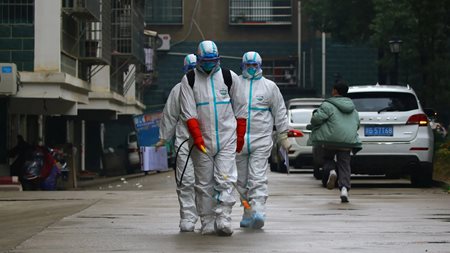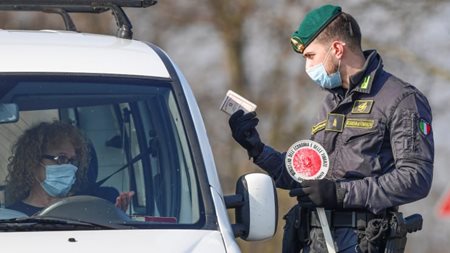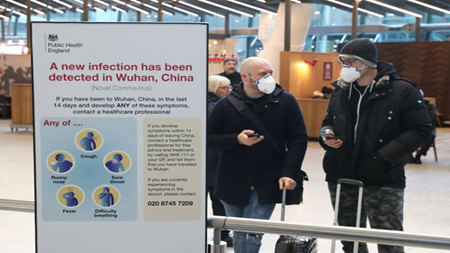.png.aspx;?width=450&height=450)
What is a coronavirus?
Coronaviruses (CoV) are a large family of viruses found in both animals and humans. Some infect people and are known to cause illness ranging from the common cold to more severe diseases such as the Middle East Respiratory Syndrome (MERS), the Severe Acute Respiratory Syndrome (SARS), and the ongoing novel coronavirus referred to as COVID-19.
This novel coronavirus is a new strain of coronavirus that has not been previously identified in humans until the outbreak was first reported in Wuhan, China in December 2019. Scientists in China announced on March 4th to have identified two separate strains of COVID-19: a more aggressive type and a lesser one. The more aggressive strain was found in early cases from Wuhan, China, where the coronavirus originated from, and researchers think it may have evolved from the less aggressive type.
How is the virus transmitted?
Much remains unknown about the COVID-19. Current knowledge is largely based on what is known about similar coronaviruses. Most often, coronaviruses are spread from person-to-person in situations of close contact (about 6 feet/2 meters).
The spread is thought to occur mainly via respiratory droplets produced when an infected person coughs or sneezes, similar to how influenza and other respiratory pathogens spread. These droplets can land in or near the mouths or noses of people who are nearby or possibly be inhaled into the lungs. It is currently unclear if a person can get COVID-19 by touching a surface or object that has the virus on it and then touching their own mouth, nose, or possibly their eyes.

Who should be concerned about COVID-19?
Most people will only experience flu-like symptoms for a few days. People at risk include those with pre-existing chronic respiratory and cardiopulmonary diseases, weakened immune systems, diabetes and hypertension. According to studies made on the reported cases, people above the age of 70 are more at risk of severe infection and hospitalization.
People currently in an outbreak epicenter zone including China, South Korea, Iran, Northern Italy and Japan, should apply extreme caution and follow local authorities’ directions regarding preventative measures and quarantine requirements.
Should travelers cancel their plans amid COVID-19 concerns?
All nonessential travel to China, South Korea, Northern Italy, Iran and its neighboring countries, Azerbaijan and Turkmenistan, should be avoided. Most governments around the globe have issued a travel ban and/or high-level advisory, asking their residents not to travel to these countries until the outbreak is under control. If you were planning to travel to one of these destinations, you should be eligible to reschedule or cancel your flights without penalties or fees. Travelers should contact their airline, hotel, travel agency or cruise line. The U.S. State Department also recently issued a Level 2 Travel Advisory for Japan recommending travelers to apply increased caution if traveling to this country.
In the U.S., The Center for Disease Control (CDC) released a warning on March 9th recommending that travelers defer cruise ship travel worldwide. The CDC informs that cruise ship passengers, especially older travelers or those with pre-existing health conditions, are at increased risk of contamination.
Besides these destinations, there is at this time no other high-level travel warnings and a low risk of being contaminated. Still, travelers should apply extreme caution and follow strict hygiene measures when traveling either domestically or internationally.

What should travelers expect?
This novel coronavirus has impacted international travels immensely, particularly the air travel industry. In the wake of the outbreak, many airlines have reduced or postponed service to at-risk destinations including China, Hong Kong, South Korea, Italy and Iran.
The World Health Organization has requested governments to implement strict measures to limit the spread of the virus in their countries. Some of the most common measures include strict health checks at airports and other public places such as shopping malls, museums and train stations. Travelers should not be alarmed by airlines and other employees wearing protective coveralls, masks and checking temperatures.
Over the weekend, the Italian Government placed its Northern regions on lock-down. This lock-down affects over 16 million residents. On March 9th, Saudi Arabia closed off air and sea travel with Bahrain, Egypt, Iraq, Italy, Kuwait, Lebanon, South Korea, Syria and the United Arab Emirates.
Several countries have also applied a ban on large gatherings such as concerts, conferences, events, and have decided to close popular public spaces such as museums and theme parks. All Disney’s theme parks in Asia, including Shanghai Disney, Tokyo Disneyland and Tokyo DisneySea are closed until further notice. In South Korea, the country’s National Museum and the National Museum of Modern Art have also been closed. Irish authorities just moved to cancel Dublin’s Saint Patrick’s Day Parade.
Many professional and sporting events are also being canceled and/or postponed. These include Geneva’s Auto Show, San Francisco’s Game Developers Conference, the world’s largest luxury jewelry and watch event, Baselworld, Houston’s Energy Conference and fashion weeks across the world. Some high-profile companies such as Google, Microsoft and Facebook are also canceling their company’s conferences and gatherings. Finally, many employers around the world are postponing all business travels to protect their employees against the risk of contamination.


When you’re experiencing any kind of emergency while traveling 100 miles away from home or in another country, Global Travel Plus assists you with relieving the additional stress experienced. Services include medical consultations, referrals and monitoring, emergency evacuation and repatriation, medical and non-medical escort, assistance with foreign hospital admission and prescriptions. With Global Travel Plus on your side, you’ll enjoy real worry-free travel everywhere in the world in any situation. For more information, visit www.globaltravelplus.com.